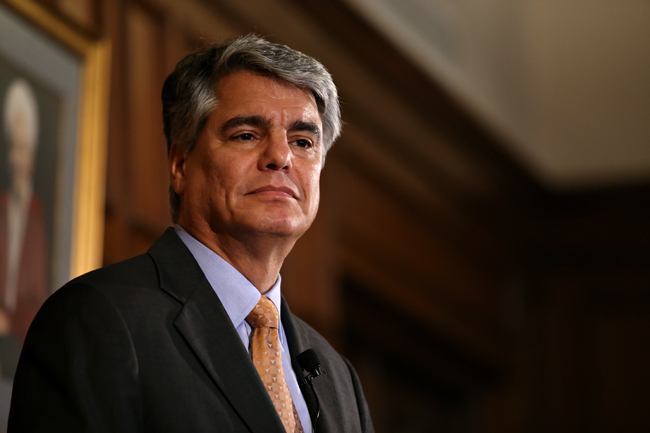In the search for a new UT president, the Board of Regents offered candidates a compensation package of $1 million base pay with a potential 12 percent bonus. That offer was a substantial increase from former President William Powers Jr.’s peak salary of $625,000. Surprisingly, Gregory Fenves, UT’s new president, negotiated his salary down to $750,000 in base pay with only a potential 10 percent bonus.
These salary figures are striking. At a university where the median salary of faculty members is $50,000, the regents’ salary offer to Fenves, a public employee, is staggering.
However, the dramatic variation in salary for the tiny fraction of administrators and coaches making hundreds of thousands of dollars annually can be traced to their position’s potential revenue generation. For example, UT football coach Charlie Strong earns more than $3 million annually because his program also generates more money than any other in the nation.
Fenves, likewise, may generate lots of revenue for the University, if his history of fundraising success continues during his presidency. As dean of the Cockrell School of Engineering, he spearheaded the college’s fundraising effort, eventually raking in more money than any other school at UT. As provost, Fenves also played a pivotal role in the development of the Dell Medical School, which will be another long-term revenue-generator for the University. If Fenves can continue to exercise his proven fundraising skills, he will more than pay for his own salary.
Both the University’s bold offer and Fenves’ negotiated acceptance sent distinct yet equally powerful messages. A $1 million base pay was meant to attract the most qualified candidates to lead UT. With the offer, the Board of Regents signaled its intent to remain competitive among top public and private universities by meeting or exceeding peer presidential salaries.
Although the Board’s offer was no doubt a calculated reflection of UT’s place in top-tier academia, Fenves’s decision to accept a salary substantially beneath the Regents’ offer was made with UT students in mind. According to Fenves, a $1 million salary was too high for a public official given UT’s affordability and tuition concerns over the last five years. And a $1 million salary could inhibit his ability to work with the Texas Legislature on financial issues that will affect faculty and students. Fenves obviously understands that appearances matter in a challenging political environment.
Still, the Regents’ salary offer was not unconscionably large. UT’s endowment competes with Harvard’s and Yale’s. And UT aspires to academic standards equal to those of Ivy League universities. UT’s top-level executive pay must remain competitive, within reason, to achieve those lofty standards. Thankfully, Fenves helped the Regents compete within reason.
















